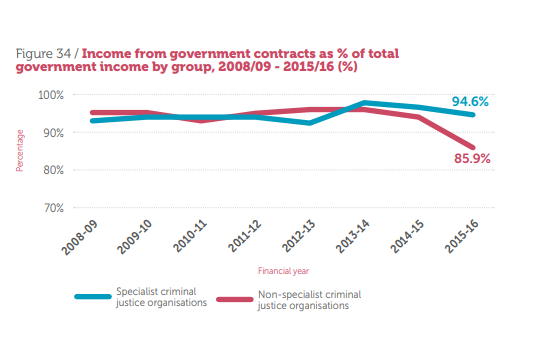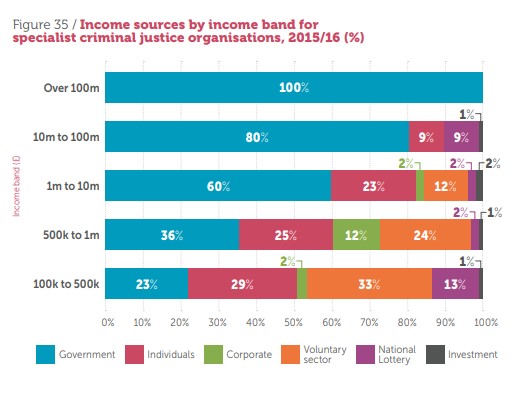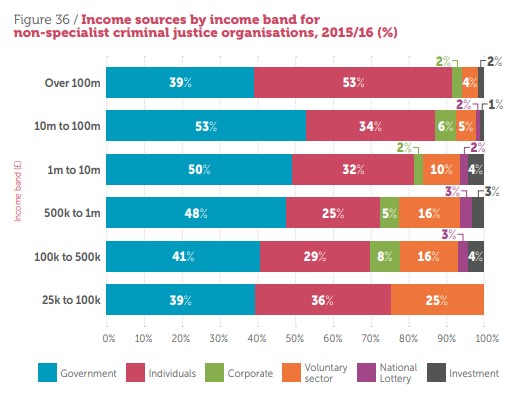Our annual State of the sector research presents the most detailed information we have on how voluntary organisations working with people in contact with the criminal justice system are faring. We explore a variety of topics, including the number of people organisations support and their needs, the services being delivered and the people delivering them, and how organisations are funded. Our latest research had a thematic focus on how organisations both identify and respond to the needs of people protected under the Equalities Act (2010).
This is the fourth in a series of blogs that aims to give a snap-shot of the key trends and issues our research uncovered, as well as what we think needs to change for the challenges organisations are experiencing to be addressed.
The financial data analysis is based on the accounts submitted to the Charity Commission. NCVO were able to analyse the financial data of 1,433 charities, almost double the number we analysed in the previous year (752). Using Clinks’ knowledge of the sector and the stated charitable aims and objectives of the analysed organisations, we split them into two groups:
• Specialist criminal justice organisations (n=320) – whose main purpose is to work in criminal justice
• Non-specialist criminal justice organisations (n=1,113) – whose service users might include people who have a conviction, but do not work in criminal justice as their main purpose.

Voluntary organisations working with people in contact with the CJS are an essential part of the criminal justice landscape, and in total received an income of £6,493m in 2015/16. For specialist organisations this figure was £668.2m whilst for non-specialist criminal justice organisations this was £5,825.6m.
As with previous years, we find that specialist criminal justice organisations remain smaller than non-specialist criminal justice organisations. 25% of specialist criminal justice organisations have an income of less than £100k, compared to 12% of non-specialist criminal justice organisations; whilst 26% of specialist criminal justice organisations have an income of more than £1m, compared to 35% non-specialist criminal justice organisations.
Government predominantly funds organisations through contracts
The largest source of income is from the government; for specialist criminal justice organisations this accounts for 75% of their total income, for non-specialist criminal justice organisations this represents 47% of the total income. The importance of funding from the government is also demonstrated if we look at the majority source of funding for organisations. This is defined as the income source that accounts for over 50% of each organisation’s total income. In 2015/16 the majority income source for both specialist and non-specialist criminal justice organisations was the government (39% and 47% respectively).
When we split the income as to whether it comes from local or national government, we find that income from local government increased for specialist criminal justice organisations. Between the financial year 2014/15 and 2015/16 their income from this source rose by 33%.
Looking at how government is funding organisations, we see that for specialist criminal justice organisations it is through contracts. 95% of government income for specialist criminal justice organisations is earned income through contracts as opposed to grants (5%). Non-specialist organisations receive a higher proportion of their income from government in the form of grants (14%) rather than contracts (86%). This is surprising, given that we know specialist organisations tend to be smaller than non-specialists, meaning we would expect them to be more reliant on grant income.
We have consistently seen that organisations delivering contracts are unlikely to achieve full cost recovery. Our 2018 survey shows that the majority of organisations (58%) are delivering services under contract or sub-contract. Of those, the majority of organisations (52%) say they sometimes achieve full cost recovery, whilst 14% say they never achieve it.
When we look at organisations providing tailored services for particular client groups, including but not limited to those protected under the Equalities Act (2010), we see a more concerning picture as:
• 17% never achieve full cost recovery on the contracts they are delivering, whist this is true for 8% of organisations who do not work in this way
• 20% always achieve full cost recovery on the contracts they are delivering, whilst this is true for 17% of organisations who do not work in this way.
These organisations also tell us that they seeing higher numbers of clients with more complex and immediate needs, and are more likely to be reducing their services than the rest of the sector. As a result organisations providing tailored services for a particular client group are working under increased pressure and strain. These organisations are an essential part of the criminal justice voluntary sector and we need to find ways to nurture and support them.
For those organisations that are not achieving full cost recovery, the majority (64%) told us they respond to this by subsiding contracts by using funding from other sources. These sources could include grant funding from charitable trusts and foundations, or using their own reserves.
Charitable trusts and foundations provide essential grant funding for small, specialist organisations
Voluntary income is defined as income that is given freely by a donor, including grants from charitable trusts and foundations. Our research continues to show the importance of this type of income for small, specialist criminal justice organisations. The smaller the organisation, the more likely they are to rely on income from the voluntary sector, than from government. In 2015/16, specialist criminal justice organisations with an income between:
• £100k and £500k, received 33% of their income from the voluntary sector, and 23% from government
• £1m and £10m received 12% of their income from the voluntary sector and 60% from the government.


These trends are mirrored when we look at the majority income source for organisations by size. In 2015/16:
• 33% of specialist criminal justice organisations whose income is between £100k and £500k received the majority of their income from the voluntary sector.
• 17% of specialist criminal justice organisations whose income is between £100k and £500k receive the majority of their income from the government
Although both specialist (82%) and non-specialist criminal justice (65%) organisations are more reliant on earned income (income organisations receive for providing a service and delivering a contract) than the UK voluntary sector as a whole (52%), the smaller the organisation, the more reliant they are on voluntary income (income given freely by a donor, including grant funding).
Next time…
The next blog in our series state of the sector in focus will look at what we, and others need to do to respond to the challenges our research has uncovered and will be published on Thursday 18th May. If you have any questions or comments in the meantime we would love to hear from you-please contact Nicola Drinkwater, Policy Manager at Nicola.drinkwater@clinks.org
What's new
Blogs
Publications
Latest on X
The role is for a leader from an organisation focused on racially minoritised people, with expertise in service delivery, policy, advocacy, or related areas in criminal justice. Racial disparities are present at every CJS stage. This role ensures these voices are central in shaping policy to help address and eradicate them. Apply by Mon 18 Nov, 10am. More info: https://www.clinks.org/voluntary-community-sector/vacancies/15566 #CriminalJustice #RR3 #RacialEquity
